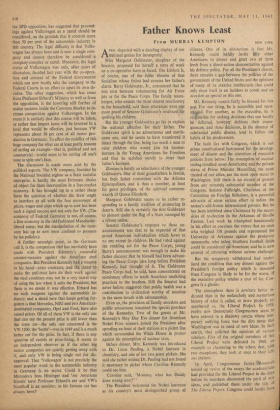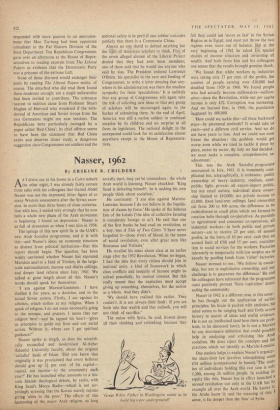Father Knows Least
From MURRAY KENIPTON
NEW YORK
raft_ departed with a dazzling display of our .n.national genius for incongruity. Miss Margaret Goldwater, daughter of the Senator, proposed for herself a term of work on a co-operative farm in Israel. The kibbutz is, of course, one of the fuller blooms of that Socialism whose tiniest bud arouses her father's alarm. Barry Goldwater, Jr., announced that he was torn between volunteering for Air Force jets or for the Peace Corps. The family house- keeper, who sounds the most sincere reactionary in the household, said these utterances were one more proof of Senator Goldwater's weakness for spoiling his children. But the younger Goldwaters go far to explain the national affection for their father. The Goldwater spirit is an adventurous and mettle- some one, and he seems to have transferred it intact through the line, being too much a man to raise children who would join his incense- burners in the Young Americans for Freedom and thus be satisfied merely to enter their father's business.
Zionism is hardly an inheritance of the younger Goldwaters. One of their grandfathers is Jewish, but their father communes with the Arizona Episcopalians, and is thus a member, at least for guest privileges, of the spiritual common- wealth of Queen Elizabeth.
Margaret Goldwater seems to be rather re- sponding to a family tradition of pioneering in deserts. Still she is certainly the first Goldwater to pioneer under the flag of a State managed by a labour union.
Senator Goldwater's response to these an- nouncements was that to be expected of that proud American individualism which bows to no one except its children. He had voted against the enabling act for the Peace Corps:, young Barry's announcement was enough to make his father discover that he himself had been advanc- ing the Peace Corps idea long before President Kennedy had thought of it. The Goldwater Peace Corps• had, he said, been concentrated on missionary efforts to teach American marketing practices to the heathen. Still the Senator had never before suggested that public health was a contribution to civilisation worthy of mention in the same breath with salesmanship.
Even so, the provision of family anecdote and public amusement remained the special province of the Kennedys. Two of the guests at Mr. Kennedy's May Day Eve dinner for American Nobel Prize winners joined the President after spending an hour at their stations at a picket line which surrounded the White House in protest against his resumption of nuclear tests. Before dinner, Mrs. Kennedy was introduced to Dr. Linus Pauling, a Nobel laureate in chemistry, and one of her two guest pickets. She said she rather wished Dr. Pauling had not found it necessary to picket where Caroline Kennedy could see him.
`Caroline said, "Mummy, what has Daddy done wrong now?" ' The President welcomed the Nobel laureates as his country's most distinguished group of citizens. One of its distinctions is that Mr. Kennedy could hardly invite fifty other Americans to dinner and greet two of them fresh from a direct-action demonstration against his defence policy. For all the President's charm, there remains a gap between the policies of the government of the United States and the opinions of many of its creative, intellectuals that could only show itself in an incident as comic and an occasion as special as this one.
Mr. Kennedy cannot fairly be blamed for this gap. For one thing, he is accessible and open- miVed. For another, as the executive, he is reSTOnsible for making decisions that can hardly be deferred, however dubious their conse- quences; and those decisions, in the absence of substantial public dissent, tend to follow the habits of his predecessors.
The fault lies with Congress, which is our prime constitutional instrument for the develop- ment of dissent and the alteration of executive policies from below. The resumption of nuclear testing troubled many Americans; and the private views of Prime Minister Macmillan, the most trusted of our allies, are the most open secret in Washington. Still there is no record of protest from any remotely substantial member of the Congress. Senator Fulbright, Chairman of the Committee on Foreign Relations, is a powerful advocate of some serious effort to soften the nation's still-frozen international posture. But he has been inhibited since Christmas by the neces- sities of re-election in the Arkansas of Orville Faubus. Last week he triumphed handsomely in his effort to convince the voters that no man who weighed 150 pounds and represented the University of Arkansas against the predatory mammoths who infest Southern football fields could be considered un-American; and he is now assured of returning without serious challenge.
But his temporary withdrawal had under- lined the condition that any dissent against the President's foreign policy which is mounted from Congress is likely to be for the worse. If the executive policy retains a coat of ice, Con- gress is a glacier.
The atmosphere there is nowhere better in- dicated than in the melancholy and mysterious history of what is called, or more properly re- membered as, the Liberal Project. In 1958, twelve new Democratic Congressmen seem. to have entered in a shadowy caucas whose tem- porary unifying force was the dim sense that Washington was in need of new ideas. In their search, they solicited the opinions of various scholars. Five of the original members of this Liberal Project were defeated in 1960, an example so chastening to the others that, with two exceptions, they took at once to their fall- out shelters. In April, Congressman James PR oosevelt bound up twelve of the essays the academicians had provided for the Liberal Project in the days before its members discovered the peril of new ideas, and published them under the title of The Liberal Papers. Congress could hardly have responded with more passion to an announce- ment that Mao Tse-tung had been appointed consultant to the Far Eastern Division of the State Department. Ten Republican Congressmen gave over an afternoon at the House of Repre- sentatives to reading excerpts from The Liberal -Papers as evidence that the Democratic Party was a prisoner of the extreme Left.
None of those alarmed would endanger their souls by reading The Liberal Papers entire, of course. The detached who did read them found them moderate enough; not a single unilateralist had been invited to contribute. The utterance nearest to sedition came from Professor Stuart Hughes of Harvard who wondered if the with- drawal of American and Soviet troops from the two Germanies might not ease tensions. The Republicans were particularly outraged by a paper called 'Red China'; its chief offence seems to have been the statement that Red China exists and deserves closer study, a dangerous suggestion since Congressmen are soldiers and the national safety is in peril if one soldier concedes publicly that there is a Communist China.
Al lost no one dared to defend anything but the right of American scholars to think. Five of the seven alleged alumni of the Liberal Project denied that they had ever been members; one of them said that he would sue anyone who said he was. The President ordered Lawrence O'Brien, his specialist in the care and feeding of Congressmen, to write a letter denying that any- where in his administration was there the smallest sympathy for these 'speculations.' It is unlikely that any group of Congressmen will again take the risk of soliciting new ideas or that any group of scholars will be encouraged again to the bother of submitting them. At the end of April, America was still a nation subject to continual surprise by its children and no surprise at all from its legislature. The national delight in the unexpected could look for its satisfaction almost anywhere except to the House of Representa- tives.



































 Previous page
Previous page